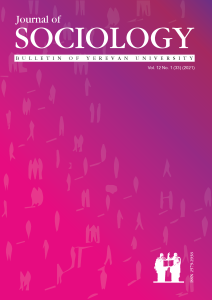Current Problems of Quality of Education in Armenia
DOI:
https://doi.org/10.46991/BYSU:F/2021.12.1.071Keywords:
quality of professional education, educational policy, educational reforms, discourse analysis, education in ArmeniaAbstract
Education policy makers are constantly faced with the problem of "ambiguous interpretation" of the concept of "quality of education". Different social groups give different interpretations of the quality of education, creating their own discourse on the quality of education. Mutual agreement between these groups is possible only if they mutually understand the discourse created by them. The article addresses the discourse on "quality of education" using complex methodology. Education policy makers circulate the following comment on the quality of education: correspondence with state educational standards. The management staff of private universities emphasizes the existence of a state accreditation as a guarantee of the quality of education provided, in the case of state universities, a state diploma. Students as a social group interpret the quality of education as compliance with the requirements of the labor market, and employers as work effectiveness. A sociological analysis of the situation provides an opportunity to identify the nature of the discourse fields created on the quality of education, their peculiarities and the possibilities of harmonization between them.
References
Robson, K. L. (2010). Sociology of Education in Canada,Open Library Pressbook. Retrived from https://ecampusontario.pressbooks.pub/robsonsoced/
Durkheim, E. (1961). Moral Education: A Study in the Theory and Application of the Sociology of Education, translated by Everett K. Wilson and Hermann Schnurer. New York: Free Press of Glencoe
Althusser, L. (1971). Ideology and Ideological State Apparatuses. Lenin and Philosophy and other Essays, translated by Ben Brewster. London: New Left Books, 121–176
Willis, P. E. (1977). Learning to Labour: How Working Class Kids Get Working Class Jobs. Farnborough, UK: Saxon House
Bowles, S. & Gintis H. (1976). Schooling in Capitalist America: Educational Reform and the Contradictions of Economic Life. New York: Basic Books
Livingstone, D. W. (1994). Searching for the Missing Links: Neo-Marxist Theories of Education. Sociology of Education in Canada: Critical perspectives in Theory, Research, and Practice, L. Erwin and D. MacLennan (Ed.). Toronto, ON: Copp Clark Longman, 55–82
King, R. (1980). Weberian Perspectives and the Study of Education. British Journal of the Sociology of Education, 1(1), 7–23. Doi: https://doi.org/10.1080/0142569800010102
Fantuzzo, J. P. (2015). A Course between Bureaucracy and Charisma: A Pedagogical Reading of Max Weber's Social Theory. Journal of Philosophy of Education. Doi: https://doi.org/10.1111/1467-9752.12095
Bourdieu, P. (1986). The Forms of Capital. Handbook of Theory and Research for the Sociology of Education, edited by John G. Richardson. New York: Greenwood Press, 241–258
Bernstein, B. B. (1971). Class, Codes, and Control. Volume 1: Theoretical Studies Toward a Sociology of Education. London: Routledge
Holt, M. (2000). Introduction: The Concept of Quality in Education. Improving Quality in Education, C. Hoy, C. Bayne-Jardine, and M. Wood, (Ed.). Falmer: London
Apple, M.W., Ball, S.J. & Armando, L. (2010). GandinRoutledge International Handbook of the Sociology of Education, Edited by, 265. Doi: https://doi.org/10.4324/9780203863701
Dworkin, G., Ballantine, J., Antikainen, A., Barbosa, M.L., Konstantinovskiy, D., Saha,L.J., Essack,S., Chang,J., Vryonides, M. & Teodoro, A. (2013). The sociology of education, 3. Doi: https://doi.org/10.1177/2056846013122
Harvey, L. & Green, D. (1993). Defining quality. Assessment and evaluation in higher education, No 18 (1). Doi: https://doi.org/10.1080/0260293930180102
Galstyan, M. (2018). Masnagitakan dasyntacnerin eritasardneri masnakcutyuny vorpes ashkhatashukayi pahanjnerin harmarvelu gortsiq, Yerevan, EPH hrat.
Downloads
Published
How to Cite
Issue
Section
License
Copyright (c) 2021 Marina Galstyan

This work is licensed under a Creative Commons Attribution-NonCommercial 4.0 International License.








